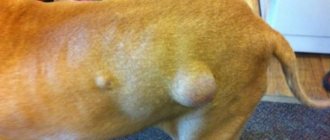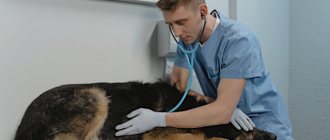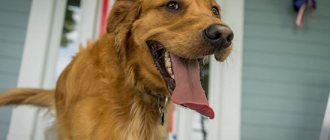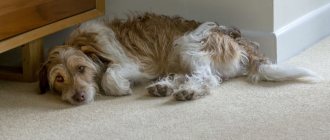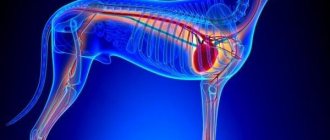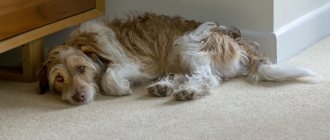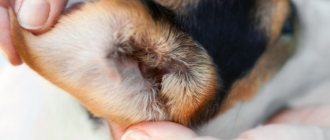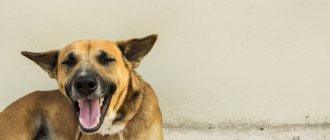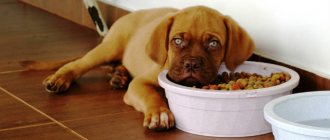Such a gentle breed of dog as the Yorkshire Terrier requires especially careful attention and care. Many owners of such fluffies have often noticed that they have an excessive appetite. Of course, “parents” often pamper their “children” with treats that are strictly contraindicated for their pet’s diet. Needless to say, very often the small stomach of such dogs simply cannot cope with processing such food. In addition, if Yorkies develop diarrhea, this leads to incurable consequences. One of the most fleeting problems that occurs after the onset of diarrhea is the rapid dehydration of the animal’s body. Today we’ll talk in more detail about how to recognize the problem in time, how you can cure such an ailment at home, and also what you should feed these insatiable four-legged friends so that such problems do not torment the poor things.
Causes
Gastrointestinal disorders can be caused by a wide variety of diseases. Let's look at the most common reasons:
- Poisoning. Due to the fact that the owners pamper the baby with spicy, salty or fatty foods, the dog’s stomach simply cannot cope with the amount of carbohydrates. Cholesterol increases inexorably, which leads to severe poisoning. Under no circumstances feed your Yorkie expired food, otherwise you run the risk of becoming a regular client of the veterinary clinic.
- The presence of worms in the body. If you don't remember exactly when the last time you treated for parasites, you should think about it. The patient’s mucous membranes are inflamed, and the body spends all its strength and capabilities to heal itself, this leads to diarrhea.
- Constant overeating will sooner or later lead to obesity, and the baby will suffer not only from diarrhea, but also from vomiting. It is believed that pocket dogs practically do not need to be walked, but this is not so. Let your little friend do all his “business” at home, in the diaper, but going for a walk with him is simply necessary. The lack of necessary physical activity will not only lead to chaos at home (after all, hooligans need to throw out their unspent energy), but will also significantly increase the risk of obesity in your pet.
- Disturbances in the intestinal microflora. Be sure to keep an eye on what your Yorkie picks up off the ground. If he eats something unsuitable for food, he may not only get food poisoning, but also die. Most likely, you have already heard more than once about “dog lovers” who scatter all kinds of poisons in places where animals gather.
- Allergy. Carefully monitor the ingredients in the food. Give preference to those brands whose manufacturers place fish or meat in the first place in the food composition, but not by-products. Such food will, without a doubt, quickly satiate the animal, but the pet’s well-being can deteriorate very quickly. Avoid feeds that do not contain corn, much less yeast.
- Sudden change of food. Most likely you tried to switch your pet to a different food than what he was used to. As a rule, this happens when switching from homemade food to dry special food, and vice versa.
How to choose treatment
First, the doctor will conduct a consultation and learn about the pet’s characteristics, its diet and lifestyle. After a clinical examination, it is rarely possible to make an accurate diagnosis, so the following is usually also prescribed:
- General and biochemical blood test.
- Stool analysis to detect infections and parasites.
- Sometimes an ultrasound of internal organs or a survey x-ray is required.
After this, treatment is prescribed.
If there are no serious illnesses, the doctor will recommend fasting, Smecta and diet for the first time.
But if an upset stomach lasts for more than a week, it means it has become chronic. Your pet may have colitis or enteritis. The reasons may be:
- Worms and other parasites.
- Benign or malignant tumors.
- Infections.
- Inflammation.
- Intestinal obstruction.
- Diseases of the pancreas or kidneys.
- Food allergies.
After determining why the dog has diarrhea (which may take more than one day), the doctor will make a diagnosis and prescribe treatment. We talked about it above. In mild cases, therapy includes medications to maintain intestinal microflora and normalize its functioning. If diarrhea is caused by allergies, you should completely change your diet. Sometimes the reason is the lack of vaccinations in dogs, which reduces their immunity.
Symptoms
It is not difficult to identify the onset of diarrhea in a Yorkie; you can deal with it yourself, just monitor his condition and behavior.
- More and more often he asks to go outside.
- The stool became liquid and mucus appeared.
- Yorkie seems lethargic and indifferent even to his favorite toys.
- Loss of appetite.
- Vomit.
- The dog dramatically reduces body weight.
- He suffers from dehydration, so he drinks noticeably more water.
- Pay attention to the color of the stool. If it has changed dramatically, it is worth taking action. We'll tell you which ones below.
- Discharge from the eyes and "cough". These symptoms are the most terrible, there is a suspicion of plague. In this case, urgent hospitalization is necessary.
What can you feed your Yorkie if he has diarrhea?
As mentioned above, you cannot feed your dog during the day. On the second day, try giving a small amount of rice cooked with chamomile infusion. The portion must be increased gradually, and you can reach a full portion only on the fifth or sixth day after the start of therapy. You should not spare your baby with your favorite treats and “sweets” - this will only slow down the recovery process. Keep in mind that your Yorkie with diarrhea should not be given fatty, spicy or salty foods. It is better to include the following components in his diet:
- Poultry and boiled eggs. If your Yorkshire Terrier is allergic to these foods, replace them with cooked turkey.
- Under no circumstances should you give your fluffy pork. It contains a huge amount of fat, so you should avoid this meat not only for the period of treatment, but also for the entire long and healthy life of the dog. The ban also applies to meat that has not undergone heat treatment: it will only contribute to the development of infectious diseases.
- Rice porridge with water or chamomile infusion. Rice, together with herbs, will calm the gastrointestinal tract and quickly remove all toxins from the body.
- Low-fat cottage cheese and boiled potatoes, naturally without salt and oil, including not only butter, but also vegetable oil.
Loose stools in a dog - treatment
Continuous loose stools are dangerous; they can be eliminated with modern tablets, mixtures, powders, and injections. Medicines for diarrhea for dogs are selected carefully; drugs for humans are not always suitable for our pets. The dosage of the chosen remedy must correspond to the weight of the sick animal, otherwise you risk poisoning your unfortunate four-legged friend, aggravating the situation.
Enterofuril for a dog with diarrhea
A good antidiarrheal agent is enterofuril, which is produced on the basis of nifuroxazide. Some pet owners use it successfully when urgent treatment for diarrhea in dogs is required. It is available in capsules or as a convenient suspension. It is advisable not to exceed the dose of 100 mg, 2 capsules three times a day, using the drug for 2-3 days. When purchasing a suspension, take 1 cube of liquid and feed the puppy 3 times a day, using a syringe with the needle removed for convenience.
Loperamide for dogs for diarrhea
In case of disorders, it is desirable to destroy the source of infection, calm the large intestine and relieve pain symptoms. Loperamide has been successfully used by many owners at a dose of 0.2 mg per kilogram of the animal’s body, eliminating colitis and significantly reducing the pet’s suffering. This medicine is perceived ambiguously by veterinarians. It is not recommended for diarrhea in a small dog; treatment with drugs of this type (loperamide, Imodium) for animals up to 10 kg without serious control is undesirable. It can occasionally provoke bleeding and intoxication during diarrhea.
Furazolidone for dogs with diarrhea
Furazolidone has been used by hobbyists and veterinarians for many years. Its antimicrobial effect helps eliminate disorders and destroy various types of bacteria, reducing the proliferation of staphylococci and inhibiting the resistance of these microorganisms to antibiotics. Yellow furazolidone tablets for dogs with diarrhea at a dosage of 10 mg/kg are recommended to be divided into 3 or 4 doses per day; treatment with the drug continues for up to 5 days.
Phthalazole for dogs from diarrhea
In the question of how to stop diarrhea in a dog, this sulfonamide drug helps well. It is prescribed for dysentery, colitis, in the fight against salmonellosis, coccidia. Treatment with these tablets after operations on the intestinal tract gives a good effect. The main substance is absorbed into the blood slightly and does not lead to poisoning. The daily dose for dogs during treatment is up to 0.5-1 g of phthalyl sulfathiazole, the standard amount per tablet is 0.5 g. It is recommended to take phthalazole in several doses per day.
How to give smecta to a dog with diarrhea?
Adsorbent drugs bind gases well, improve the patient’s condition and help remove toxins, bacteria and viruses from the body. Smecta for dogs with diarrhea in a dosage of 10 ml dissolves in liquid. Using a syringe without a needle, the suspension is injected into the animals’ mouths in three doses to treat diarrhea and severe poisoning. It is advisable to maintain an interval of one and a half hours between doses of smecta and another drug.
Activated charcoal for dogs with diarrhea
Activated carbon, proven for decades, is a sorbent that safely removes toxic substances and gases from the sick body. If a dog has diarrhea, treatment with the drug at home is carried out in a dosage of 1-2 g in 3 or 4 doses per day. The feces become dark in color, but this does not negatively affect the well-being of the animals. The tablets can be ground into powder, then shaken in water. In case of poisoning, charcoal is used for intestinal lavage in large quantities.
Is it possible to give a dog chloramphenicol for diarrhea?
Broad-spectrum antibiotics effectively cope with the problem of loose stools caused by harmful microorganisms. Levomycetin - anti-diarrhea tablets for dogs with an unpleasant bitter taste. For dogs, 10-20 mg of this drug is prescribed for treatment a couple of times a day. The medicine comes in powders, capsules, tablets, so you need to carefully study the amount of active ingredient in the package before taking it.
Enterosgel for a dog with diarrhea
This product with a porous structure and silicon molecules in its composition belongs to the group of enterosorbents. It is supplied in the form of a jelly-like mass, packaged in tubes, light in color and without a distinct odor. In the case of how to cure dangerous diarrhea in a dog, enterosgel is used with an interval of up to two hours between meals. Puppies are offered half a teaspoon, and adult dogs a full spoon of gel for a week. You can dilute it with water and feed it to capricious pets using a syringe without a needle.
Preventing Diarrhea in Yorkies
Simple rules that must be followed will allow you to avoid health problems, including those in the gastrointestinal tract:
- Do not ignore your veterinarian's advice regarding your baby's diet. Your Yorkie's diet should be balanced.
- Carefully monitor the condition and well-being of the dog. Remember that diarrhea is not an independent disease: it is almost always accompanied by disruption of the gastrointestinal tract and the digestive system as a whole. A sudden change in the color and shape of the stool indicates that it is time to visit the veterinary clinic. Don’t hesitate: while you are trying to save money and cure your Yorkshire Terrier yourself and at home, the dog is most likely suffering a lot. The disease can develop very quickly, and if you hesitate to visit a doctor, you may simply not have time to save your pet.
- Be sure to visit your veterinarian for a routine checkup. Don’t be shy to ask what you may think are “stupid” questions. They may be the ones who can save your Yorkie's life.
Let's sum it up!
The first steps to take if your dog has diarrhea are:
- Try to find out the cause, identify external factors that could influence its occurrence
- Short fasting diet (as described above in paragraph 1)
- Provide access to water, or better yet, give a saline solution like Regidron to drink
- Nutrition adjustments, if necessary (remove new foods, feed familiar foods)
- In case of uncomplicated diarrhea, sorbents can be given
If diarrhea continues for more than a day or other symptoms appear, you should immediately contact a veterinary clinic.
What not to do:
- You cannot use antibiotics and antimicrobials yourself. Only a veterinary doctor should select an antibiotic, its dosage, and frequency of use. There are strict indications and contraindications for the use and choice of antibiotics. What works for people often doesn't work for dogs. In addition, improper use of antibiotics makes bacteria resistant to them. And this is very dangerous.
- You cannot use a drug such as Loperamide or drugs with a similar effect on your own. They “stop” the intestines and in most diseases can worsen the course of the disease and cause complications
- Do not give your dog folk remedies from the vodka with egg series and other miraculous potions. In addition to wasting time, you can also cause poisoning and burns to the digestive tract.
CALL, take care of your pet's health!
VET CLINIC DOG AND CAT
Kharkov (M. 23 August) st.
Novoprudnaya, 9B OPENING MODE: ROUND THE CLOCK
Call center:
☏ (057) 751-32-42 ☏ (063) 722-88-48
☏ (066) 875-31-13 ☏ (096) 880-89-11 viber
